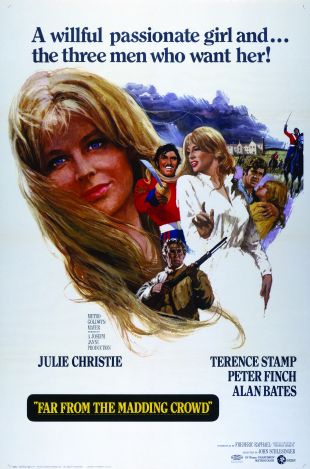
Praised by critics but shunned by audiences, this 1967 British film captures the brooding beauty of the English countryside and the young woman it sometimes symbolizes, Bathsheba Everdene (Julie Christie). Christie's character is a young woman courted by two rustics and a dashing soldier, whose fates hang by the thread of her caprice and charm. As she works her way from immature fixation on dashing Terence Stamp (Sgt. Troy of Her Majesty's Dragoon Guards) to mature love for Alan Bates as Gabriel Oak, an unassuming farmer she earlier rejected, the cinematography, the musical score and the splendid acting perform in synergy to make the most of the unfolding drama. Based faithfully on Thomas Hardy's 1874 novel of the same name, the film showcases nature as it mocks or mimics the emotions of the characters through gloomy fog, gnarled roots, and the blush of a setting sun. Director John Schlesinger's original wide-screen version of the film aptly frames the community in which these characters live, the fictional county of Wessex, which is the real-life county of Dorsetshire, Hardy's home. Located in southern England near the English Channel, Wessex is a remote little paradise, "far from the madding crowd's ignoble strife," as poet Thomas Gray described such a place in his "Elegy Written in a Country Churchyard." But strife does visit Wessex; it arrives in the form of jealousy, cruelty, unrequited desire and a shocking murder, all of which churn maelstroms in the souls of Christie, Bates, Stamp and Peter Finch, a wealthy farmer who is Christie's third suitor. Bates, Stamp and Finch are especially good as they vie for and interact with Christie. In the end, calm returns to Wessex as the characters return to "the noiseless tenor of their way." Richard Rodney Bennet won an Academy Award nomination for his haunting music score, and the film itself earned a place as No. 79 on The British Film Institute's List of top 100 films. It is an honor it richly deserves.
